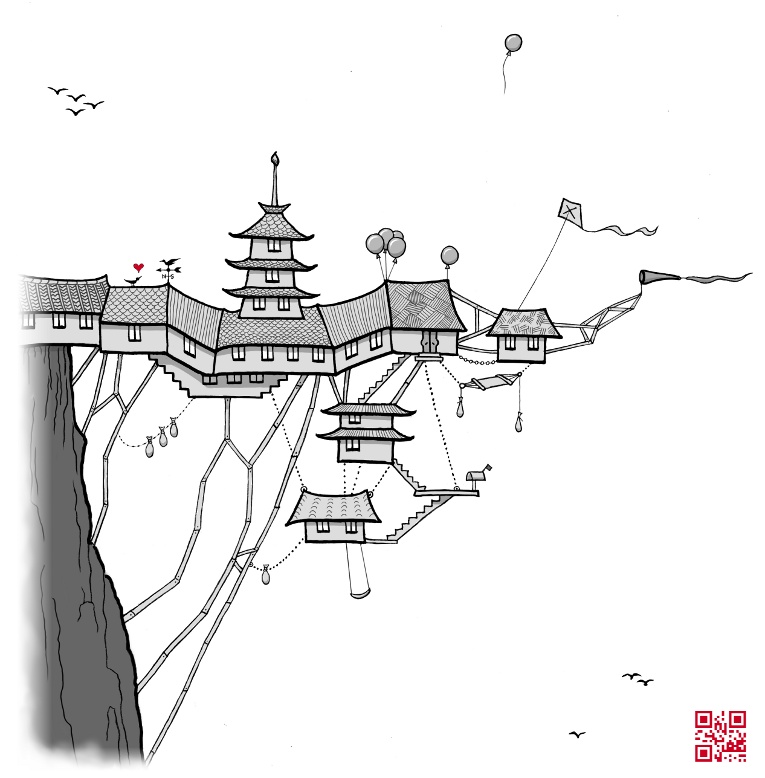Many thanks to Tristan Morris for creating a beautiful illustrated hardcover print edition of the site

 |
|
 |
 |
 |
|
 | |
 | |
 | |
A senior monk, recently inducted into the temple, approached the Java master in frustration:
“I am tasked to add several features to the Imperial Shoemaker’s order-processing system, yet I cannot begin to comprehend how it works. The logic is distributed among multiple applications, each implemented with wildly different technologies. Instead of creating common utilities the authors have merely copied swaths of code from place to place, often introducing subtle differences afterward. Background jobs seek and modify database records for no documented reason, and the database itself conspires against me: a simple update of one table can trigger a cascade of inserts and deletes in others.”

“I see two paths before you,” said the Java master. “In the first, you make only the necessary additions and quickly proclaim victory. In the second, you begin the arduous task of refactoring the code base. How will you proceed?”
The monk bowed in shame. “I cannot say. At present I am afraid to touch anything, lest my ignorance prove my undoing.”
“Fear makes good armor but a poor blade,” nodded the Java master. “To defeat your fear, we must dispel your ignorance.” With his staff he slid the window-screen open and gestured to the forest beyond.
“Follow the Road of White Nettles for three days into the mountains, and you will come to a hermitage perched on a cliff. A learned brother dwells there who keeps copies of our client’s documentation. He will advise you on the design of the system.”

The monk did as he was told, and at sunset came to the hermitage, which was a building unlike any he had ever seen.
It had clearly begun life as a sturdy stone house at the very edge of the cliff, but three new wings of rough-hewn pine with bark shingles now thrust well beyond the cliff and into space. Beyond these were open walkways and stairways, ending in dozens of rooms perched on diagonal stilts that were (only barely) supported by rocky outcroppings far below.
Lashed onto the rooms were other additions stretching still further out into the void, made of bamboo and canted crazily in all directions. Ramps and ladders erupted from their undersides, leading to isolated rooms suspended by ropes and made chiefly of reed and straw. Everything was bound together with lines of hemp, tied off at a windowsill here and a weathervane there, as though some great drunken spider had caught a hundred huts in its web. The structure swayed sickeningly in the gentle breeze, creaking as it did.

The monk stood gaping for a while, then recovered himself and struck the gong.
From the furthest room came the hermit, shimmying up ropes and down rooftops, disappearing into a trapdoor of bamboo and finally reappearing at the door of the hut.
“What news to me from the temple?” asked the hermit. “Have I been summoned home at last?”
The monk indicated that he had no such news to relay.
The hermit hung his head. “Miserable me! For until such word is given, my task is to expand this hermitage ever outward beyond the cliff’s edge, to house the temple’s growing collection of temporary files. This I have done for years now, faithfully and unquestioningly, hoping to one day earn the master’s favor and return from exile. But I confess that my work becomes more difficult with each passing season. Winter snows hang so heavy on the rooftops that the bamboo stilts begin to buckle, and in summer I must fight the magpies to keep my straw walls from becoming part of someone’s nest. By the by... you are not (I hope) possessed of any allergies? Pollen? Ragweed? I once watched seven rooms collapse and tumble down the cliff in answer to a vigorous sneeze...”

“But this is madness!” cried the monk. “Now that you have some sense of how many rooms are needed, can you not tear down this monstrosity and start anew?”
“What nonsense. Imagine the time such an endeavor might take, and how displeased my master might become in the meanwhile! How could I justify subtracting storerooms instead of adding them? My exile might be extended for another decade! No, it is far safer to do exactly as I have been commanded. Anyway, I understand this hermitage quite well, its strong places and weak ones; and so long as I tread lightly and avoid pepper, my odds of perishing in a long fall are reasonably low.
“But enough of my plight, learned brother. If you were not sent here to summon me home, then you must need my help understanding the Imperial Shoemaker’s order-processing system. Many like yourself have come for that purpose, for it was I who was its author.”
The monk only bowed and departed back down the road, having already obtained the promised enlightenment from the hermitage.

An excerpt from The Codeless Code, by Qi (qi@thecodelesscode.com).
Provided under the Creative Commons Attribution-NonCommercial 3.0 Unported License.














